- Sanitation systems
- Treatment of wastewater, sludges, organic waste, excreta
- Composting
- Pilot project on co-composting in Lokossa, Benin (GIZ)
Pilot project on co-composting in Lokossa, Benin (GIZ)
18k views
- AlexandraDubois
-

- Administrator
- Technical advisor specialized in water, sanitation and hygiene. I work for GIZ since 2012 and have gathered experience in the sub-Saharan region mainly. Since January 2022, I work as an advisor for the “Water Policy Sector Programme - Innovations for Resilience” in Bonn and I am part of the SuSanA secretariat.
Less- Posts: 66
- Karma: 6
- Likes received: 47
Re: Wanted: New mentor for co-composting project in Benin! (pilot project by GIZ from 2012-2014)
Thank you very much for your reply to my post. I am sure that the group of gardeners would appreciate if they knew that we are discussing their case on an international forum. Yet, their access to the discussion platform would be a challenge, not only because of the language (most of them can't even speak french) but mainly because we are speaking about people of a certain generation in a rural environment.
I also believe that by translating some of the SuSanA material and documentation in French, we might open the floor to more members (especially for our partners from West Africa) and more participation in the forum, which will lead to a more accurate picture of the Sanitation situation worldwide. But, I am aware that a bilingual platform would require a massive effort... Maybe, starting small, with the translation of the main key documents and few relevant discussion threads...
Regarding the issue of the UDDT owners not willing to pay for the emptying service of their toilet, I think we have several scenarios: some people would rather emptying them themselves to save money, some are just not managing their toilets properly...
Technical Advisor
Sector Programme Water Policy – Innovations for Resilience
Division Climate Change, Environment & Infrastructure
GIZ │Deutsche Gesellschaft für
Internationale Zusammenarbeit (GIZ) GmbH
Friedrich-Ebert-Allee 32
53113 Bonn, Germany
Please Log in to join the conversation.
You need to login to reply- Elisabeth
-
- User is blocked
- Freelance consultant since 2012
Less- Posts: 3372
- Karma: 54
- Likes received: 932
Re: Wanted: New mentor for co-composting project in Benin! (pilot project by GIZ from 2012-2014)
The post that you made here on 5 January was a real highlight for me! Why? Because you are being very honest with the problems that are apparent in Lokossa. So often people don't want to talk about their projects anymore when there are failures. So I applaud you for that.
I wish we could help that group of gardeners in Lokossa, Benin somehow. Do you think they would feel at least some moral support if they knew we are discussing their case here? Would they read on the forum (I am assuming probably not)?
One of the problems you pointed out was this one:
I've heard about this kind of problem before. Willingness to pay... do the UDDT owners rather empty the toilets themselves and dump the material somewhere or do they use the material for their own gardens? Do you know anything about that?• Most of the UDDT owners don’t pay the collection fee to the group in charge of collecting and emptying the container of dry faeces. As of today, only 10 UDDTs (out of 30) are being emptied by the group.
We have by the way only 27 SuSanA members in Benin. I guess language is a big issue, as they would prefer French.
Kind regards,
Elisabeth
Freelance consultant on environmental and climate projects
Please Log in to join the conversation.
You need to login to reply- AlexandraDubois
-

- Administrator
- Technical advisor specialized in water, sanitation and hygiene. I work for GIZ since 2012 and have gathered experience in the sub-Saharan region mainly. Since January 2022, I work as an advisor for the “Water Policy Sector Programme - Innovations for Resilience” in Bonn and I am part of the SuSanA secretariat.
Less- Posts: 66
- Karma: 6
- Likes received: 47
Re: Wanted: New mentor for co-composting project in Benin! (pilot project by GIZ from 2012-2014)
My name is Alexandra, Barbara asked me to reply to your message since I was the one who implemented the project on the ground from 2012 to 2014. First of all sorry for my very late answer. I was quite busy with the end of the year activities, moreover it was a bit challenging to get feedback from the concerned people in Benin. From the information I gathered the current situation is as follows:
The co-composting plant in Lokossa is still operational and the group of gardener still present but the activities have drastically slowed down. In August 2014, after an intense marketing campaign (radio spots, radio shows, flyers, hiring of a salesman, etc.) people showed interested and demand seemed relatively high. However, in the meantime the group of gardeners faced numerous issues, which rapidly undermined the growth of compost productivity:
• Most of the UDDT owners don’t pay the collection fee to the group in charge of collecting and emptying the container of dry faeces. As of today, only 10 UDDTs (out of 30) are being emptied by the group.
• The city council failed to fulfil its commitments (subsidies stopped earlier than agreed, organic waste is not delivered to the site regularly, etc.). The communication between them and the group is very difficult. The group is not receiving any kind of support from their main partner and feels somewhat left out.
• The clients are becoming rare. People are complaining that the product is too expensive and that the performance does not reach the one of chemical fertiliser. Moreover, some people show their concern regarding the fact that the product contain human excreta.
• During the dry season the water is scarce, leading to a slowdown in the pace of activity (compost making needs regular watering).
• The mentioned problems, in turn, create tensions within the group members who feel discouraged and less motivated to pursue.
I admit that the depicted picture is rather grim, but at least some lessons can be learned from it. I believe that only few adjustments are needed to improve the overall situation and that some of the issues can be solved with a minimal support from external parties. Therefore I appeal to everyone the same way Barbara did in 2014 (see message above) who happen to be based or travelling to Benin and is willing to support the project. Few words of encouragement or advice to the group would already make a whole difference.
Thank you and best regards from Nairobi
You will find in attachment some few pictures of the composting plant’s current state
Technical Advisor
Sector Programme Water Policy – Innovations for Resilience
Division Climate Change, Environment & Infrastructure
GIZ │Deutsche Gesellschaft für
Internationale Zusammenarbeit (GIZ) GmbH
Friedrich-Ebert-Allee 32
53113 Bonn, Germany
Attachments:
-
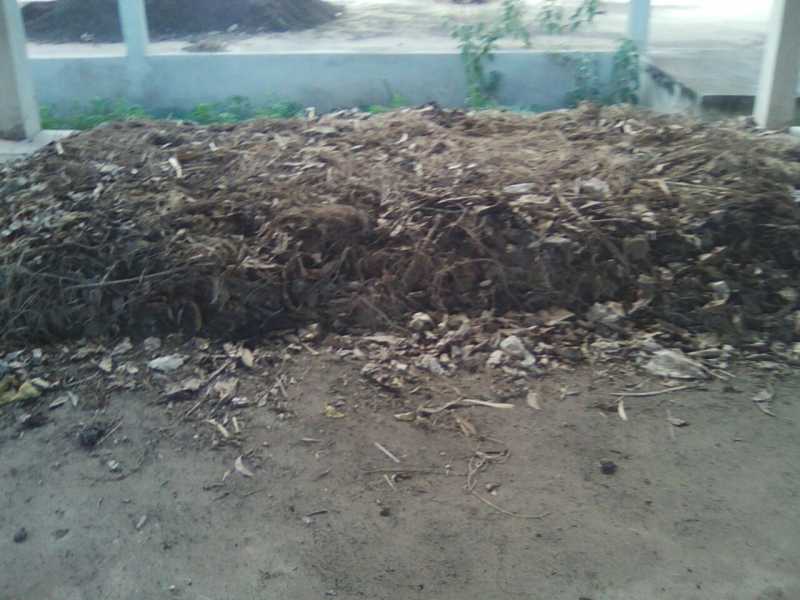 IMG-201612...0002.jpg
(Filesize: 49KB)
IMG-201612...0002.jpg
(Filesize: 49KB)
-
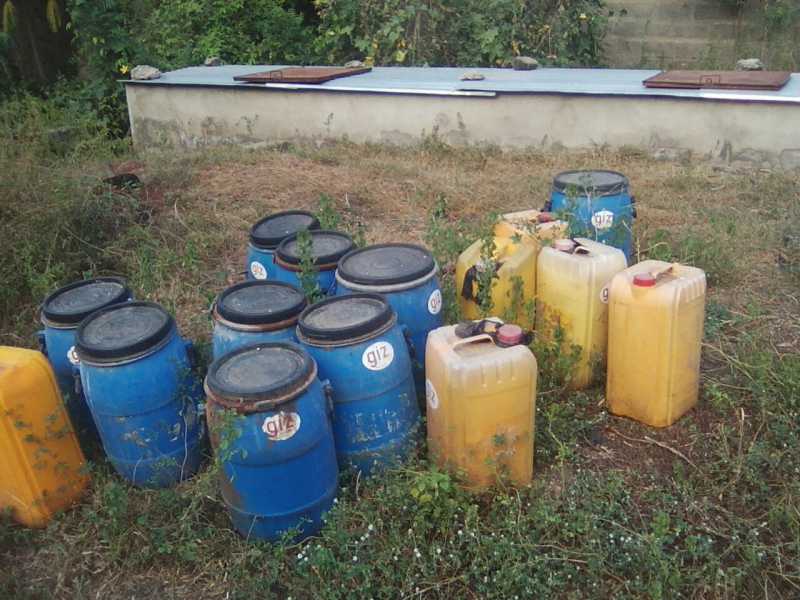 IMG-201612...0003.jpg
(Filesize: 63KB)
IMG-201612...0003.jpg
(Filesize: 63KB)
-
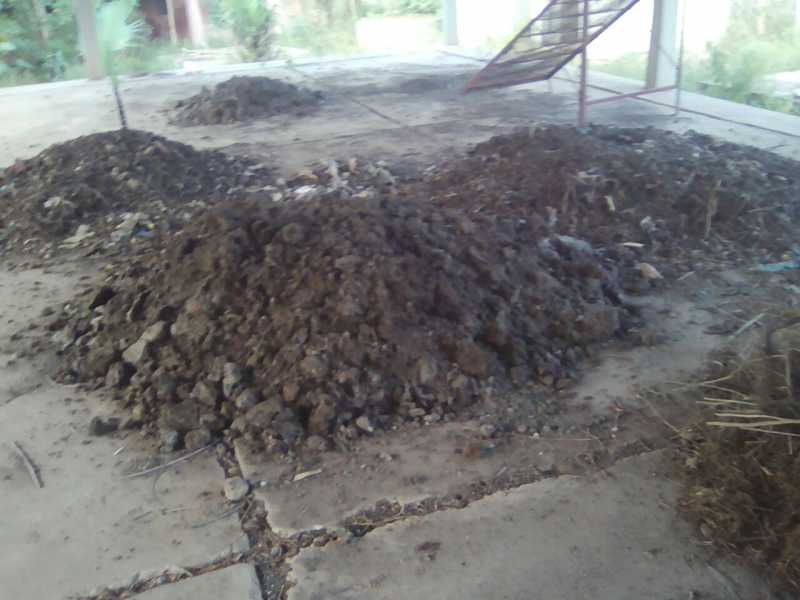 IMG-201612...0005.jpg
(Filesize: 42KB)
IMG-201612...0005.jpg
(Filesize: 42KB)
Please Log in to join the conversation.
You need to login to replyRe: Wanted: New mentor for co-composting project in Benin! (pilot project by GIZ from 2012-2014)
what is the current state of the co-composting plant in Lokossa - two years after the end of the project, any information on that? Has further effort been taken in scaling up? Thank you for the detailed report on the obstacles which you faced. We are currently looking out for the most important learnings regarding sustainable operation, as we are approaching a similar project in Karnataka, India.
Best regards from CDD Society Bangalore
Susanne
Consortium for DEWATS Dissemiation (CDD) Society
Bangalore, India
cddindia.org
Please Log in to join the conversation.
You need to login to reply- Florent
-

- sustainable sanitation study project manager
Less- Posts: 37
- Karma: 1
- Likes received: 6
Re: New mentor for co-composting project in Benin? (pilot project by GIZ) - and Ebola
I spent 2 years in Lokossa between 2005 and 2008 to work with togolese refugees on sanitation and water issue.
I will go to Lokossa in november, I don't at that time my final dates but I will be in Benin from 3 to 26 november.
I will be very pleased to visit composting site and Ecosan construction. Today, I don't know how to participate or answer to your call but it could be a good time to exchange with you and your team.
Since 2008, I worked with Toilettes Du Monde on Ecosan systems and feacal matters composting, meanly in France and in Gabon.
cheers
Please Log in to join the conversation.
You need to login to reply- BarbaraOE
-

- Advisor at GIZ on solid waste management, but also interested in sanitation and drinking water supply
Less- Posts: 5
- Karma: 1
- Likes received: 11
Re: Wanted: New mentor for co-composting project in Benin! (pilot project by GIZ from 2012-2014)
Thanks for your interest and encouragement!
To address your questions, here they are again, with answers following:
What sort of up-scaling plans did you have or do you have?
Concerning up-scaling, our aim was to find partners in Benin who would be interested and willing to roll-out this approach in other regions. This is also why we have worked as much as possible with NGOs that were already active in the region and have an expertise in related topics: they would gain from the experience and be able to promote findings and lessons learned. This is still an approach that we continue and our partner GI Mono, which is an intermunicipal association is interested, promotes the idea and continues to support the gardeners group that carries out the composting. It was also our hope to make the composting activity economically viable, so that the group of gardeners would see it as their own interest to enlarge their scope by taking on more waste and finding households interested in the system of excreta collection - in close cooperation with the Municipality, for whom the system can represent a solution to several problems at once.
What would be the best case scenario for the future of this kind of work in this city?
Well, best case would be for the Municipality to take this project on (more than now) and see in it a possible solution for the sanitation issues in the commune. They should be the ones to enlarge the project to more households and more significant amounts of waste through cooperating with a private entrepreneurs.
What would be the worst case scenario?
At this moment: Ebola... A risk which will cause us to stop collecting fresh feces.
Obviously it is the insecure handling of the feces and the spreading of disease through the compost. Which is why it is highly possible that the sanitation angle of the project will be closed down shortly...
If things were to fall into disrepair, where do you see the biggest risks? In the UDDTs no longer being used? Or in the UDDTs only being used until they are full? Or the faecal matter being taken out but not composted safely?
As said before the spreading of disease through the compost if the feces is not properly composted is the biggest risk I see, right alongside the health risk for the people in charge of handling the feces. I am not so much concerned about the UDDTs since the households were also instructed on how to use them should the collection system fail - and knowledge on this head is available in the region also later on.
Are UDDTs becoming quite common in Benin, like in other countries in the region (e.g. Burkina Faso)? What about composting, is it quite well known in Benin?
UDDTs are being promoted in Benin, also by the authorities, but I haven´t seen many of them in Lokossa - and if, they have been built in the villages rather than the town center (by PROTOS). As explained in the documents, in Lokossa center only ~50% of the population have access to basic sanitation, in the outlying villages the percentage is much lower. Open defecation is still very common. But if you offer to donate latrines, everybody will want one, it really seems to be a question of not wanting to spend money on it...
Composting projects seem not very common, I only know of 2 other projects (one in Porto Novo and one in Parakou - but I suspect there is more going on!
I would also be interested to hear about other such projects in Benin and the experiences made, if someone is willing to share...
Al the best,
Barbara
Note by moderator: The mentioning of Ebola (for the first time on this forum?) has lead to an important conversation about Ebola and dry toilets which I have now split off into a new thread, please see here:
forum.susana.org/forum/categories/26-hea...lets-open-defecation
Please Log in to join the conversation.
You need to login to reply- Elisabeth
-
- User is blocked
- Freelance consultant since 2012
Less- Posts: 3372
- Karma: 54
- Likes received: 932
Re: pilot project on UDDTs and composting by GIZ in Benin
Thanks a lot for informing us about your pilot project in Benin which has now come to an end and which involved 30 UDDTs (28 at household level and 2 at public level) and community-level composting.
I see that the SuSanA case study about this project and additional documents are now available here:
www.susana.org/en/resources/library/details/2068
Dubois, A. (2014). Combined solid waste management and basic sanitation Lokossa, Mono region, Benin. Case study of sustainable sanitation projects. Sustainable Sanitation Alliance (SuSanA)
Some photos: www.flickr.com/photos/gtzecosan/sets/72157646455859545/
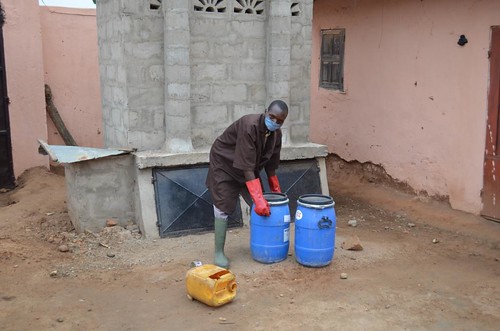
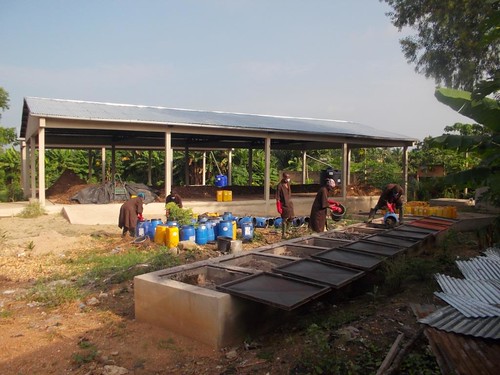
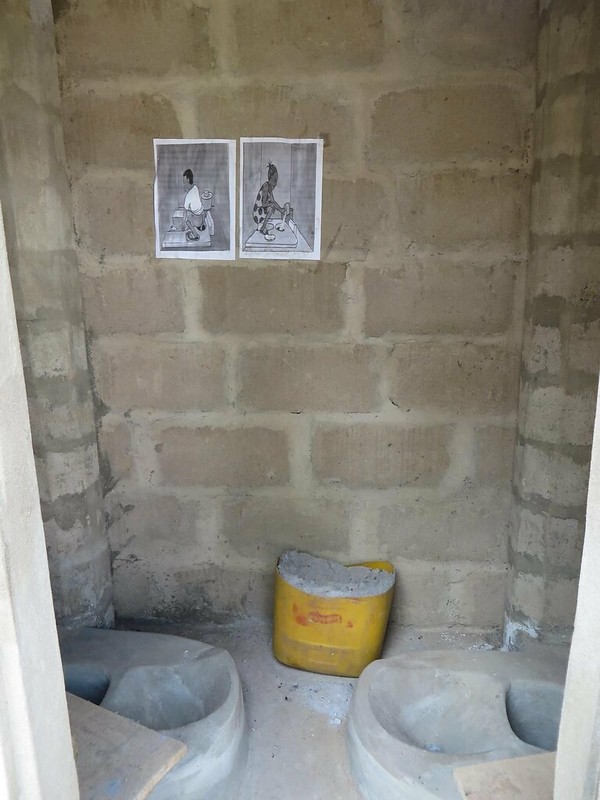
I really appreciate your openness, describing in detail in the case study all the problems and delays that you faced.
For example, you wrote:
Early withdrawal of the GIZ coordination team
The GIZ field coordination is due to be over in mid-August
2014, which is only 7 months after the launch of the
composting plant activities. Even though the departure of the
GIZ team has been postponed as much as possible (because
of the delays accumulated during the project implementation)
the withdrawal will come at an early stage. This may impact
the effective operation of the activities and therefore
jeopardize the sustainability of the project. The project’s
partners (especially the city council) are meant to take over
the GIZ coordination and monitoring activities, however it has
been observed during the temporary absence of the GIZ
coordination team in April and June 2014 that their
involvement was below expectations and that the group of
gardeners was more or less left on its own. Therefore a focus
is currently given on finding new partners who could in one
way or another support the project activities.
If we ask you questions on the forum now, please don't take this as criticism in any sort, it is just about learning from your work (it is always so easy to criticise what other people have done, but doing it better oneself is more difficult!).
You mentioned in the case study:
A year later (October 2013), after an evaluation of the
implemented activities and the potential of the project, BMZ
has assigned an additional budget to scale up the project,
which has led to a reinforcement of activities.
My questions:
What sort of up-scaling plans did you have or do you have?
What would be the best case scenario for the future of this kind of work in this city?
What would be the worst case scenario?
If things were to fall into disrepair, where do you see the biggest risks? In the UDDTs no longer being used? Or in the UDDTs only being used until they are full? Or the faecal matter being taken out but not composted safely?
Are UDDTs becoming quite common in Benin, like in other countries in the region (e.g. Burkina Faso)? What about composting, is it quite well known in Benin?
I am very impressed with the level of documentation you have done for this project and encourage anyone to browse through the various documents available in your post above or here:
www.susana.org/en/resources/library/details/2068
Thanks a lot for telling us about this interesting project.
Kind regards,
Elisabeth
Freelance consultant on environmental and climate projects
Please Log in to join the conversation.
You need to login to replyRe: New book on "Anaerobic digestion of organic solid waste" - and interlinkages between waste recycling and sanitation?
Maybe an alternative route would be to create a fertilizer product which has less volume and is easier to store than compost? That might increase marketability and also user-acceptability.
What I am thinking of is biochar soil-conditioner. The used charcoal needs to be primed with nutrients to avoid it leaching the soils after application. This is commonly done by co-composting it, or by utilizing (solid-waste?) leachate high in nutrients (and sometimes bio-slurry from digesters).
If sufficiently high carbon solid waste is available (banana stems, rice husks, maize buds, etc.) the charcoal could also be made on site, with the larger pieces sold for cooking while non-marketable remains are stacked into leachate filters (for improved effluent quality) that are sold as biochar-fertilizer after sufficient nutrient loading.
The main risk is probably that some toxic pollutants end up in the solid waste (batteries etc.) which would then contaminate the leachate and in turn the bio-char fertilizer.
Please Log in to join the conversation.
You need to login to reply- BarbaraOE
-

- Advisor at GIZ on solid waste management, but also interested in sanitation and drinking water supply
Less- Posts: 5
- Karma: 1
- Likes received: 11
Re: New book on "Anaerobic digestion of organic solid waste" - and interlinkages between waste recycling and sanitation?
Dear All,
Thank you, Elisabeth, for introducing the GIZ pilot project in Lokossa, in which I am involved, too.
In our experience linking SWM and sanitation is a big challenge, but not so much the technical side of it but the inter-institutional side. In such a project you will easily double the number of stakeholders to involve and must plan for loads of coordination time.
I agree with you, Kris, that the problem with composting is the low price achievable for the product. We are facing this difficulty at the moment in the Benin project and are investing our efforts into creating a market for compost. At the same time, the gardeners that run the composting plant already use it for the production of vegetables and therefore have some self-interest to continue the activity even if the price for compost remains low.
We had decided to go for composting because it seemed to demand less technology input, has lower risks and is a technology already known in the region. Biogas would have been completely new and therefore would have demanded a much longer preparation time.
Please Log in to join the conversation.
You need to login to reply- BarbaraOE
-

- Advisor at GIZ on solid waste management, but also interested in sanitation and drinking water supply
Less- Posts: 5
- Karma: 1
- Likes received: 11
Would you like to explore the possibilities to compost faecal waste with other biodegradable waste streams in sub-Saharan Africa? Are you active in Benin and would be willing to invest some time to assist a group of gardeners that work in co-composting? Are you looking to build up on experiences to change sanitation and waste management?
From 2012 to 2014 the GIZ Advisory project on Concepts for sustainable waste management has implemented a pilot project in Lokossa, south-western Benin, in cooperation with the local GIZ Water and sanitation programme. The objective is to explore the feasibility of implementing joint solutions for the sanitation sector and the waste sector.
Specifically, the pilot project is aimed at contributing to the improvement of waste management and basic sanitation as well as at developing income-generating activities and boosting the agricultural sector of the region through the production of compost.
We have financed the construction of 30 EcoSan latrines, the rehabilitation of a composting site and collection material for the different waste streams. The waste of the latrines is collected in containers and transported to the composting site, where the faecal matter is sun dried in concrete beds before mixing it with the biodegradable fraction of solid waste delivered by the municipal services. The co-composting is done through layers-built windrows and the process is regularly monitored to ensure that the necessary temperature for destruction of pathogens is obtained.
Our main partner is the municipality who is now officially in charge of continuing the project. We are working with a group of gardeners who is in charge of collecting the containers from the latrines and of composting the two waste streams. The enriched compost produced is sold as soil conditioner and alternative fertilizer and used by the group in a demonstration plot located in the composting site.
As this is “only” a pilot project we don´t have the mandate to continue our support to the municipality and the group of gardeners. We recognize that to guarantee sustainability, the activities of the group in charge of composting would need further support to continue as they are currently facing several challenges:
• Fee collection rate for the excreta collection service is low
• Sale of the compost has not yet picked up, marketing needs to be intensified
• Covering costs and generating revenue from the composting activity is not satisfactory
• Regular monitoring of the process and quality control of the compost is not yet a matter of course
The Municipality while showing willing to support the group is not able to help much in the day to day running of the facility.
Support needed:
• Process control to ensure that the compost is produced according to international standards (pathogens elimination)
• Support in marketing and advertising the product
• Awareness raising among the population in general and the households unwilling to pay collection fees
More information on the project can be found in the SuSanA case study databank:
www.susana.org/en/resources/case-studies/details/2068
Photos: www.flickr.com/photos/gtzecosan/sets/72157646455859545/
Contact me for further information or if you want to get in touch with our partners on the ground! Via email (This email address is being protected from spambots. You need JavaScript enabled to view it.) or phone (+49 61 96 79 1090)
Cheers, Barbara
Attachments:
-
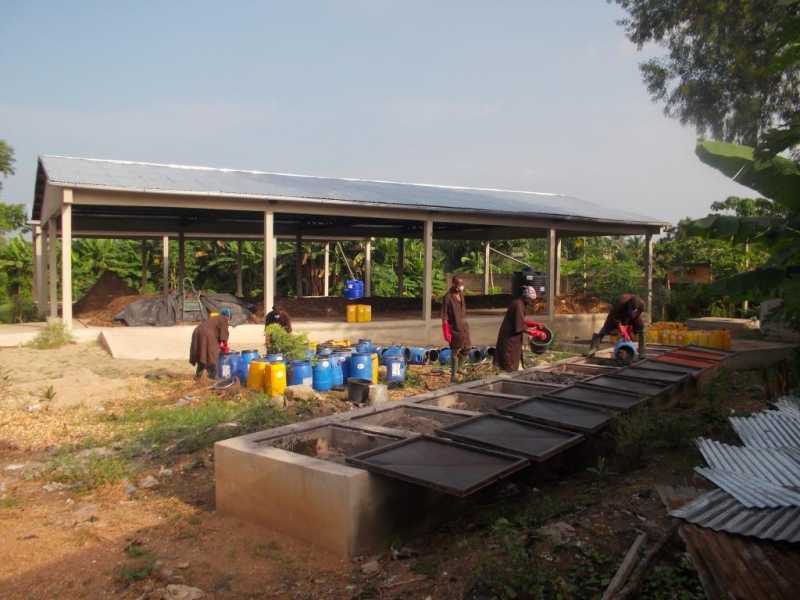 Excretatreatment1.jpg
(Filesize: 47KB)
Excretatreatment1.jpg
(Filesize: 47KB)
-
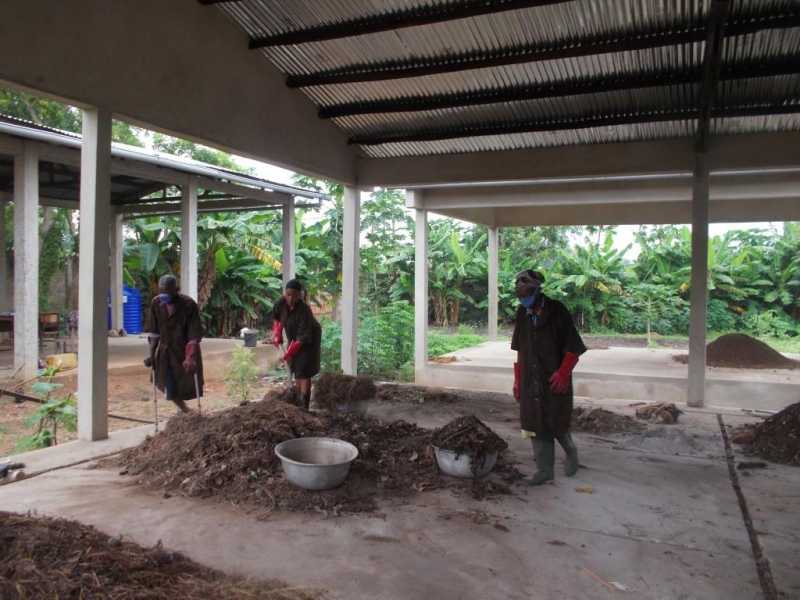 Sortingofwaste.jpg
(Filesize: 53KB)
Sortingofwaste.jpg
(Filesize: 53KB)
-
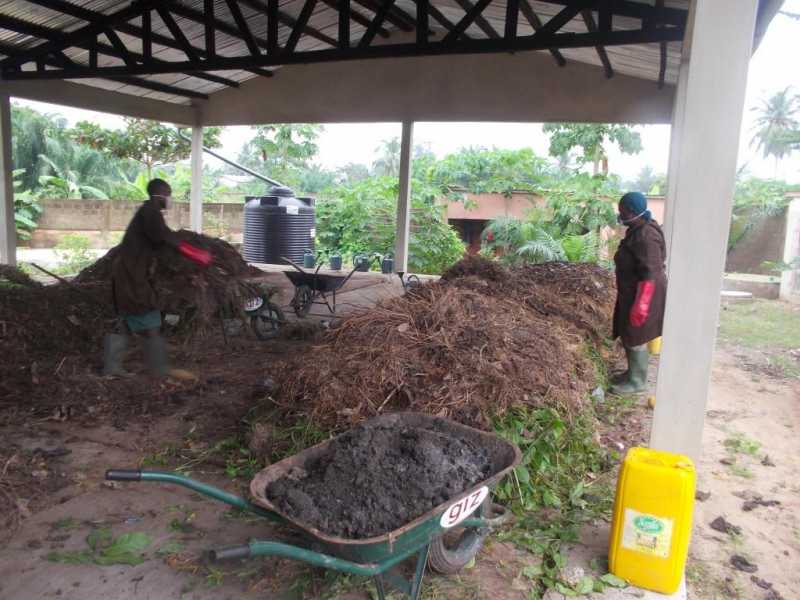 Windrowbuidling6.jpg
(Filesize: 57KB)
Windrowbuidling6.jpg
(Filesize: 57KB)
-
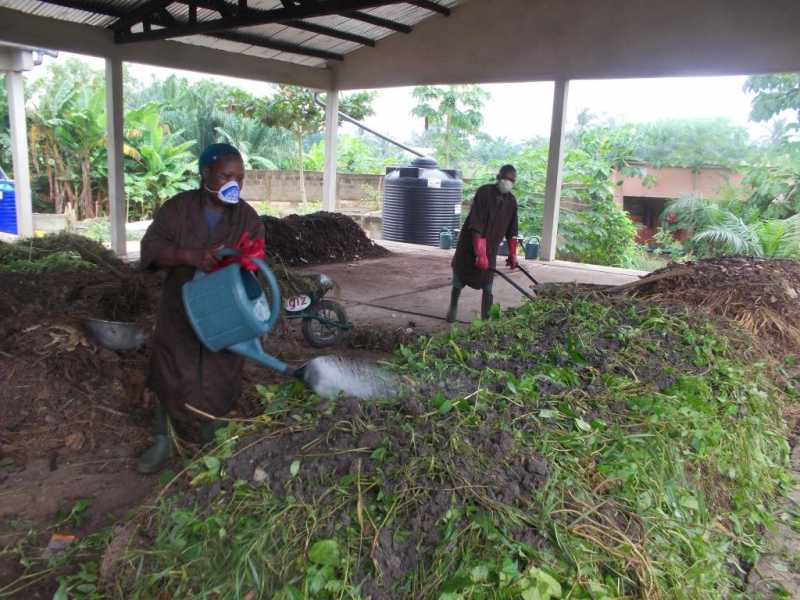 Windrowwatering2.jpg
(Filesize: 65KB)
Windrowwatering2.jpg
(Filesize: 65KB)
-
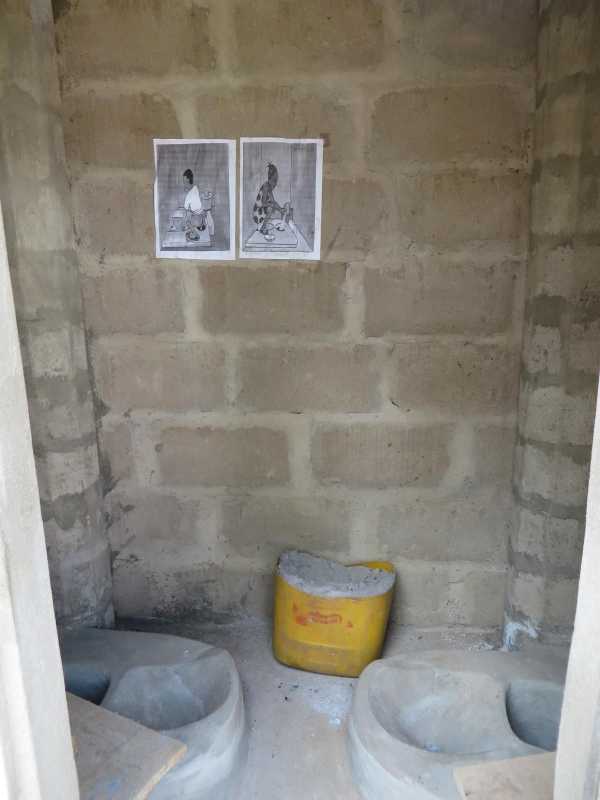 ECOSAN3.jpg
(Filesize: 29KB)
ECOSAN3.jpg
(Filesize: 29KB)
-
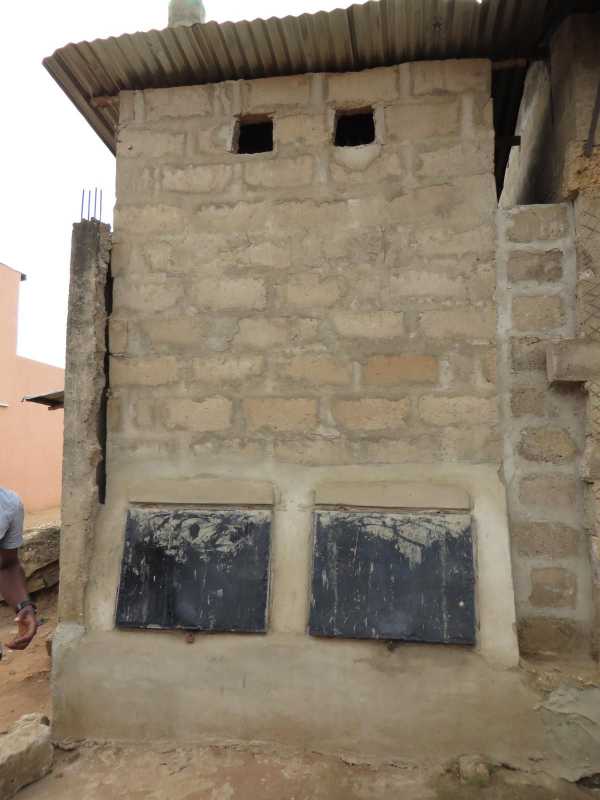 ECOSAN4.jpg
(Filesize: 36KB)
ECOSAN4.jpg
(Filesize: 36KB)
Please Log in to join the conversation.
You need to login to replyNew book on "Anaerobic digestion of organic solid waste" - and interlinkages between waste recycling and sanitation?
forum.susana.org/forum/categories/35-bio...-and-sanitation#9524
++++++++++++
Thanks for those links. I was actually in Lokossa in Spring 2012 and met the local giz representatives. Although our cooperation partner back then, the regional water authority (which seemed to have became a bit obsolete after a politically motivated devolution of power to the municipalities) seems to be not involved in this project.
In my view composting isn't a very promising solution as all evidence so far seems to show that compost is is not marketable at a price that makes it attractive.
Biogas on the other hand has a much higher (perceived) value and if direct utilisation for electricity generation is done, the engine waste heat can be used to heat the digesters to thermophilic conditions. This not only improves gas production speed, efficiency and quality (higher methane content) but also makes the resulting product much safer in regards to pathogens.
Edit: even more so in thermophilic dry-batch type reactors as a >55° temperature and 2-3 week long treatment period can be guaranteed. Thus EPA and WHO bio-solid regulations for safe reuse should be easily attainable in such a setup.
Please Log in to join the conversation.
You need to login to reply- Sanitation systems
- Treatment of wastewater, sludges, organic waste, excreta
- Composting
- Pilot project on co-composting in Lokossa, Benin (GIZ)








